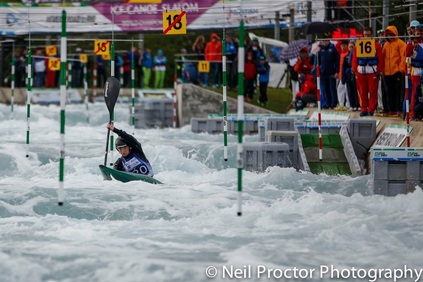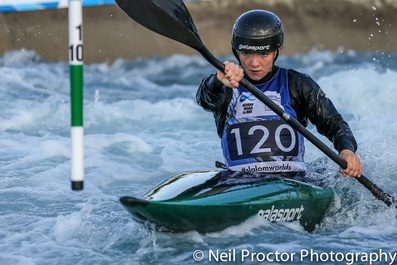
So arguably canoe slalom like many technique dominant disciplines, progresses primarily through experience. There is a noticeable pattern in paddlers that not only have started from a young age, but have had the input of top athletes, whether parents, coaches or training partners, also from very early in their careers. This kind of high quality training and feedback would be described in Bounce (Syed, 2011) as the 'Power of Practise' or high quality hours of training. I think quite a lot of people have read the book. I'm in, as far as Syed's concluding philosophy relates to slalom. What I'm interested in now, having spent the last seven weeks or so racing and practising on prevalent UK slalom courses with the best canoeists in the world, is how different experiences affect the individual, and what effect individual attitude can have on how they receive them.
If you read some inspirational pinterest quotes, you can come out thinking ALL experience is good. You learn from mistakes, success inspires you, get up and get stronger and all that. I like them as much as anyone! However I was thinking about my experience, and what kinds I prefer. I come out of having good, positive experiences, such as winning the Paul McConky cup, feeling elated, confident and firmly believing in my abilities. Good experience = tick. But then I think about it. Doing demonstration runs for London World Championships, on the semifinal course, I probably had one of the best runs of my life. I didn't make any mistakes, on a course that brutalised so many hopes for medals. Good experience = ... a really horrendous final run the next day. All I could think about was how good my run the previous evening had been. Easy, I thought. Now I just have to do it in front of even more people. If any athletes are reading this I think they can recognise the death blow before I'd even crossed the start line. Good experience = mental instability = cross.
But! But. Two good experiences produced by two good full runs. What was different? My attitude on receiving. At the Nottingham race, I was able to refocus after the semifinals. At London World Championships, I didn't even try. So now on to bad experiences.
Imagine a mild summer evening in Nottingham. The session has been prepared, progressive courses have been set. Walking from the bank, they look okay. Some tough moves but hey, we're good aren't we? Always up for a challenge, looking forward to the nice feeling of getting a really hard move clean (without touching or missing any gates). Run one goes down... Disaster. No sections completed without missing a gate. Not to worry, I was probably too flippant with my course plans, so change them and get on with it. Run two. ...also a disaster. I'm starting to get pretty pissed off with myself. Like a good egotistical human my initial instinct is to find things wrong with my coach, with the course, my boat, ANYTHING. Actually, after two more fuming, enraged, horrendous runs, I stop looking for things to blame my poor performance on. And of course, on run five, everything is clean. Smooth paddling, no mistakes. No random edges thrown down in the hope of success. I'd stopped focussing on why my runs were bad, and just let my reflexes and auto pilot do the canoeing for me.
So in that one I think the bad physical experiences contributed towards a positive mental outcome. It was very clear to me which mindset was bad, and which one was good. During a race it isn't so easy. An absolute classic is 'final fever' - making it to the finals of a competition to blow out, because you were either too excited or too nervous to concentrate properly on canoeing. Learning from a positive experience is almost harder (for me) because quite often my brain won't look for the key points and things to remember, and will just focus on the fact that the outcome was good.
But then in training, when I've done a move great - for example the down left to high up right on 'Ben Nevis' at the Olympic course in Lee Valley - it is almost branded on my mind how I need to act to repeat that move. I would say its ten times better for me to have a positive experience in training, in terms of being able to repeat it, than a bad one. When I'm struggling with a move, I learn all the terrible ways that it can go wrong. In the long term, I think this is probably a more concrete way of learning. In my paddler's eyes, I'll be able to recognise the features of disaster before they happen. In the short term, I feel a lot better when I am able to repeat the move multiple times without issue, as it positively reinforces the experience in my mind and makes it easy to plan it in a race.

 RSS Feed
RSS Feed
